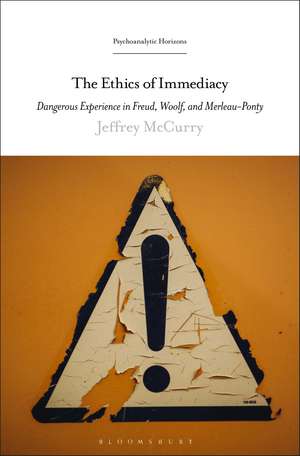The Ethics of Immediacy: Dangerous Experience in Freud, Woolf, and Merleau-Ponty: Psychoanalytic Horizons
Autor Dr. Jeffrey McCurry Professor Esther Rashkin, Professor Mari Ruti, Professor Peter L. Rudnytskyen Limba Engleză Hardback – noi 2023
Din seria Psychoanalytic Horizons
- 14%
 Preț: 193.36 lei
Preț: 193.36 lei - 7%
 Preț: 155.84 lei
Preț: 155.84 lei - 23%
 Preț: 197.86 lei
Preț: 197.86 lei -
 Preț: 154.50 lei
Preț: 154.50 lei - 7%
 Preț: 121.14 lei
Preț: 121.14 lei - 7%
 Preț: 123.53 lei
Preț: 123.53 lei - 8%
 Preț: 99.06 lei
Preț: 99.06 lei - 8%
 Preț: 146.12 lei
Preț: 146.12 lei - 8%
 Preț: 145.90 lei
Preț: 145.90 lei - 23%
 Preț: 229.41 lei
Preț: 229.41 lei - 22%
 Preț: 226.51 lei
Preț: 226.51 lei - 23%
 Preț: 221.28 lei
Preț: 221.28 lei - 22%
 Preț: 224.29 lei
Preț: 224.29 lei - 23%
 Preț: 221.91 lei
Preț: 221.91 lei - 21%
 Preț: 216.99 lei
Preț: 216.99 lei - 8%
 Preț: 152.28 lei
Preț: 152.28 lei - 21%
 Preț: 218.54 lei
Preț: 218.54 lei - 21%
 Preț: 216.88 lei
Preț: 216.88 lei - 7%
 Preț: 156.28 lei
Preț: 156.28 lei - 24%
 Preț: 194.93 lei
Preț: 194.93 lei - 23%
 Preț: 190.75 lei
Preț: 190.75 lei
Preț: 537.87 lei
Preț vechi: 772.57 lei
-30% Nou
Puncte Express: 807
Preț estimativ în valută:
102.92€ • 110.06$ • 85.81£
102.92€ • 110.06$ • 85.81£
Carte tipărită la comandă
Livrare economică 18 aprilie-02 mai
Preluare comenzi: 021 569.72.76
Specificații
ISBN-13: 9798765107249
Pagini: 224
Dimensiuni: 140 x 216 mm
Greutate: 0.4 kg
Editura: Bloomsbury Publishing
Colecția Bloomsbury Academic
Seria Psychoanalytic Horizons
Locul publicării:New York, United States
Pagini: 224
Dimensiuni: 140 x 216 mm
Greutate: 0.4 kg
Editura: Bloomsbury Publishing
Colecția Bloomsbury Academic
Seria Psychoanalytic Horizons
Locul publicării:New York, United States
Caracteristici
Interprets Freud's early psychoanalysis phenomenologically in a way that provides a horizon for developing a phenomenological understanding of modernism more broadly.
Notă biografică
Jeffrey McCurry is Director of the Simon Silverman Phenomenology Center and Affiliated Faculty in the Department of Philosophy, Duquesne University, USA. He is also a member of the faculty at the Pittsburgh Psychoanalytic Center.
Cuprins
IntroductionAn Existential Revolution: A New Ethics of Experience1. Another Kind of Revolution: Existential2. Exploring Existential Revolutions: Cultural Sources3. The Freudian Age: A Recent Revolution4. Preview: Questions and Chapters Part I: Freud Before the Freudians1. Toward Unsettled Life: Anomaly and Quandary in Freud2. Toward Insane Life: Immorality and Incoherence in FreudPart II: Freudians Beyond Freud3. Toward Creative Life: Recalcitrance and Futurity in Woolf4. Toward Wondering Life: Mystery, Miracle, and Menace in Merleau-Ponty ConclusionThe Freudian Age: A Contemporary HorizonNotesIndex
Recenzii
Jeffrey McCurry's superb study - of Freud, Virginia Woolf, and Maurice Merleau-Ponty - reveals the essence of the phenomenological project as shared by all three: a focus on the ephemeral yet indelible immediacy of our existence as living subjects. In so doing he sheds original light on the ethical, esthetic, and spiritual resonances of this project, thereby locating phenomenology at the beating heart of modernist life and thought. McCurry shows that Woolf and Merleau-Ponty are key participants in what he terms the Freudian age. At a still deeper level he demonstrates that Freud himself is imbued with the spirit of phenomenology. This is a book of unusual subtlety that offers a novel orientation toward key questions of psychology and philosophy.
It is generally thought phenomenology and psychoanalysis do not go together.The Ethics of Immediacy shows the limits of this view. Jeffrey McCurry demonstrates and develops Freudian interpolations in Woolf's modernist literature and in Merleau-Ponty's phenomenology, and in doing, so incites the possibility of a renewed ethics from immediate experience. This book launches an ethical depth-charge to its reader: without any ideal, normative prescription, or even expectation, what responsibility, if any, does one have to interrogate immediate experience in one's own life and times?
It is generally thought phenomenology and psychoanalysis do not go together.The Ethics of Immediacy shows the limits of this view. Jeffrey McCurry demonstrates and develops Freudian interpolations in Woolf's modernist literature and in Merleau-Ponty's phenomenology, and in doing, so incites the possibility of a renewed ethics from immediate experience. This book launches an ethical depth-charge to its reader: without any ideal, normative prescription, or even expectation, what responsibility, if any, does one have to interrogate immediate experience in one's own life and times?
